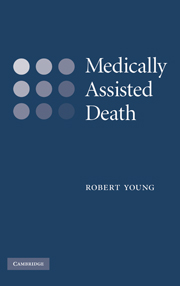Book contents
- Frontmatter
- Contents
- Acknowledgments
- 1 Introduction
- 2 A case for the legalisation of voluntary medically assisted death
- 3 Medical futility
- 4 Physician-assisted suicide
- 5 The sanctity of human life
- 6 Killing versus letting die, the doctrine of double effect, and palliative care for the dying
- 7 Professional integrity and voluntary medically assisted death
- 8 Competence and end-of-life decision making
- 9 Advance directives
- 10 Voluntary medically assisted death and slippery slope arguments
- 11 Non-voluntary euthanasia
- 12 Concluding remarks
- References
- Index of English-language legal cases
- Index of names and subjects
7 - Professional integrity and voluntary medically assisted death
Published online by Cambridge University Press: 05 June 2012
- Frontmatter
- Contents
- Acknowledgments
- 1 Introduction
- 2 A case for the legalisation of voluntary medically assisted death
- 3 Medical futility
- 4 Physician-assisted suicide
- 5 The sanctity of human life
- 6 Killing versus letting die, the doctrine of double effect, and palliative care for the dying
- 7 Professional integrity and voluntary medically assisted death
- 8 Competence and end-of-life decision making
- 9 Advance directives
- 10 Voluntary medically assisted death and slippery slope arguments
- 11 Non-voluntary euthanasia
- 12 Concluding remarks
- References
- Index of English-language legal cases
- Index of names and subjects
Summary
Health care professionals (like professionals in other fields) sometimes say both that there are particular actions that they cannot in good conscience undertake to perform, and actions that they must undertake if they are to maintain their professional integrity. Physician-assisted suicide and active voluntary euthanasia have often been cited by health care professionals, and their professional organisations, as actions that would violate professional integrity. Some individuals go further and insist that because participation in voluntary medically assisted death is professionally unacceptable to them, that even to transfer someone in their care to another health care professional who has no qualms about facilitating a request for medically assisted death would be inconsistent with their personal and professional integrity.
Medical critics of the legalisation of voluntary medically assisted death often appeal to considerations like these in order to challenge its compatibility with professional integrity. In this chapter I will consider whether physicians may justifiably appeal to professional integrity as a ground for refusing to participate in physician-assisted suicide and voluntary euthanasia (and thus to oppose their legalisation). To do that will require, first, that I set out, albeit briefly, an account of professional integrity. Next, I shall argue that responding to a request for medically assisted death is compatible with what professional integrity demands in medicine. (From this nothing follows, of course, about whether a particular doctor ought to offer such aid.)
- Type
- Chapter
- Information
- Medically Assisted Death , pp. 113 - 136Publisher: Cambridge University PressPrint publication year: 2007



